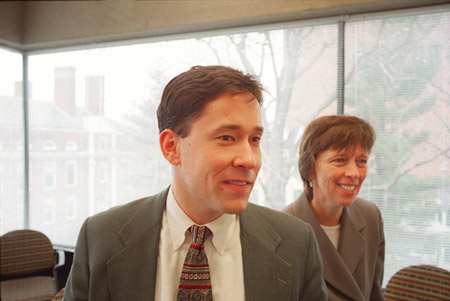Operating without a curriculum
New teachers ‘lost at sea,’ GSE study finds

A first-year science teacher starts the school year knowing nothing about the course he’s been hired to teach except its title: Physical Sciences.
A novice elementary school teacher, mandated to teach world religions, spends her after-school hours at the local library reading about Christianity, Islam, and Hindu, then wrestles her new knowledge into something her second-graders will understand.
An engineer-turned-math teacher is given a textbook that bears no relation to the algebra standards she is supposed to teach, so she cobbles together lessons from other sources, including her own physics textbook.
Few new teachers in Massachusetts receive a clear and detailed curriculum and are “lost at sea” without it, according to a new study from the Harvard Graduate School of Education’s (GSE) Project on the Next Generation of Teachers. The study, which interviewed 50 first- and second-year teachers in urban and suburban public and charter schools, showed that the problem exists even in a state with a highly developed system of standards and accountability.
“The absence of a coherent curriculum has implications for student achievement and teacher retention,” said Susan Moore Johnson, Pforzheimer Professor of Education in Learning and Teaching and director of the Project on the Next Generation of Teachers. “Students may learn less than they otherwise might, while many new teachers who could have succeeded with more support may leave teaching prematurely because of the overwhelming nature of the work and the pain of failing in the classroom.”
The study found that one-fifth of the new teachers in the sample – most commonly secondary school teachers and elementary teachers in social studies and science – received no operational curriculum at all. Over half of the respondents reported that they encountered a curriculum that specified topics or skills to teach but no guidance about how to teach them. And only two teachers in the sample said they had a highly specified curriculum for most subjects or classes they taught.
Nineteen of the 50 new teachers had the added pressure of teaching subjects and grade levels where the Massachusetts Comprehensive Assessment System (MCAS), the state’s high-stakes test, was administered.
“The frameworks and high-stakes test introduced pressure without support and a mandate without materials,” said GSE doctoral student David Kauffman, first author on the study. “That seemed to be generating a lot of the frustration among new teachers.”
The mad scramble
In the absence of specified curriculum, new teachers engaged in what they called “the mad scramble,” said Kauffman. “They spent a lot of time and in some cases money trying to figure out what to teach and how best to teach it,” he said. Most teachers teach several subjects, multiplying the scramble.
Some teachers attempted to translate state-mandated frameworks or MCAS objectives into curriculum, the study found. Yet while curriculum frameworks might describe academic standards students should achieve – addition and subtraction, similes and metaphors, or the origins of the Revolutionary War, for instance – they do not guide new teachers toward specific content, sequence, instructional materials, or pedagogical methods.
The researchers were surprised that the new teachers craved curricular direction at the expense of the sort of creative autonomy often heralded as a benefit of classroom teaching. “It is counterintuitive. We expected that these people would want a great deal of autonomy,” said Johnson. “But the idea of having to develop each curriculum anew is really daunting.”
Kauffman agreed, stressing that because the teachers in the study were new, they did not have creative, effective curricula to pull out of a drawer – that autonomy came at a price of long hours and tedious trial and error. “These teachers would welcome the structural support that would at least guide them in what they were doing,” he said.
What’s more, good curriculum leaves plenty of room for imaginative teaching. “Teaching is such a complex field, it requires [the teachers] to adapt to the learners they have in front of them,” said Kauffman. “A well-designed curriculum can be specific without being rigid or simplistic.”
Successful teachers are happy teachers
While the researchers conducted the study in Massachusetts, they believe that lack of curriculum for new teachers, especially in states that have adopted standards-based reform or high-stakes tests, reaches across state borders. “It’s an issue that certainly has implications for other states,” said Johnson.
Johnson and Kauffman, along with doctoral students Susan Kardos, Edward Liu, and Heather Peske, summarized their research in the article “Lost at Sea: New Teachers’ Experiences With Curriculum and Assessment,” which appears in the current issue of Teachers College Record. The study recommends action at the state, district, and school levels, urging states to align curriculum needs with state-mandated reforms and calling for schools to encourage collaboration and mentoring between experienced and novice teachers.
The project has begun follow-up research with this group of teachers to quantify the impact that curriculum has on their longevity in teaching. “Teachers’ decisions to continue in teaching depended on their sense of being successful in the classroom,” said Johnson. As America faces an unprecedented demand for new teachers in the next decade, teacher retention needs to be a priority, she said.
Like any employee in any field, job satisfaction is tied to a feeling of accomplishment, possible only with effective tools to get the job done. “The teachers are looking for an opportunity to be successful in this work,” said Kauffman. Clear curriculum, said Kauffman and Johnson, is one tool that will help them succeed.




